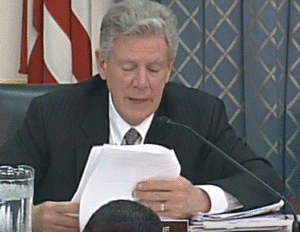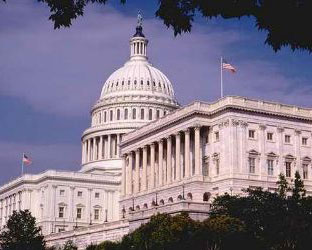WASHINGTON, D.C. — It was a fait accompli, given the seating of FCC Commissioner Anna Gómez as the third and decisive Democratic vote needed to push through key proposals fueled by the Biden Administration.
Nevertheless, the FCC’s party-line 3-2 vote on Thursday that reclassifies broadband service as a Title II telecommunications service — a.k.a. the restoration of “net neutrality” — received a flurry of responses. Democrats praised the vote, while Republicans condemned it.
For FCC Chairwoman Jessica Rosenworcel, the decision erases a Pai Commission decision to reverse a reclassification of broadband under Title II engineered by the FCC under Tom Wheeler.
And, should President Trump return to the White House, putting Brendan Carr in a position to succeed Rosenworcel as FCC Chair, it’s a safe bet a 3-2 Republican party will go back to the days when Ajit Pai ended “net neutrality” — an act that yielded widespread outrage and personal attacks on Pai.
In the majority’s view, restoring net neutrality allows the FCC to protect consumers, defend national security, and advance public safety.
Carr and Republican colleague Nate Simington hardly agree.
With today’s vote, the Commission says it will exercise its authority over broadband “in a narrowly tailored fashion — without rate regulation, tariffing, or unbundling — to foster continued innovation and investment.”
Furthermore, the Rosenworcel Commission is touting how, with “net neutrality,” internet service providers will again be prohibited from blocking, throttling, or engaging in paid prioritization of lawful content, “restoring the rules that were upheld by the D.C. Circuit in 2016.”
The Commission will have the ability to revoke the authorizations of foreign-owned entities who pose a threat to national security to operate broadband networks in the U.S. The Commission has previously exercised this authority under section 214 of the Communications Act to revoke the operating authorities of four Chinese state-owned carriers to provide voice services in the U.S. Any provider without section 214 authorization for voice services must now also cease any fixed or mobile broadband service operations in the United States.
The FCC also says it can now play an active role in monitoring internet service outages.
What does ACA Connects President/CEO Grant Spellmeyer have to say on behalf of the association representing the interests of small and independently-owned MVPDs and broadband internet service providers in Washington?

“With its internet takeover, the FCC is creating mountains of uncertainty for smaller broadband providers who will be forced to shift much-needed investment dollars away from their networks to pay for expensive regulatory compliance costs,” he said. “This will set back our members’ ongoing work to close the connectivity gap in areas of the country that lack reliable services. ACA Connects will continue to support efforts, including litigation, to overturn these heavy-handed, unnecessary utility-style regulations, which only serve to discourage development of robust and reliable broadband service for all Americans.”
Berin Szóka, President of TechFreedom, elaborated on comments filed with the FCC that note the courts are likely to find Title II reclassification a “major question” that must be decided by Congress—and why only legislation can resolve the net neutrality debate. “It’s been seven years since the FCC repealed the 2015 net neutrality rules, yet the Internet is no less open, innovative, or free than ever. Net neutrality has survived without FCC rules because consumers demand unrestricted access to the Internet, ISPs promise to meet that demand, and the Federal Trade Commission already ensures that consumers get what they’re promised. There’s no need for the FCC to do more than what it does now: require disclosure of any non-neutral practices. Reclassifying means stripping the FTC of its general jurisdiction to enforce consumer protection laws—yet another sign that this is a matter for Congress to decide.”
In contrast, Barbara van Schewick, Professor of Law at Stanford Law School and the Director of Stanford Law School’s Center for Internet and Society who professes to be a leading expert on “net neutrality,” calls today’s vote a “big win for free speech, entrepreneurs, small business, and marginalized communities. Chairwoman Jessica Rosenworcel made it clear ISPs may not interfere with what we do online, a sentiment that I and nearly everyone in this country agrees with.”

While House Energy & Commerce Commission Chair Cathy McMorris Rodgers and Senate Commerce Committee Ranking Member Ted Cruz expressing their dismay over the “Net Neutrality” restoration at the FCC, House E&C Ranking Member Frank Pallone Jr. (D-N.J.) and Communications and Technology Subcommittee Ranking Member Doris Matsui (D-Calif.) issued a joint statement praising the vote.
“Today the FCC has rightfully reclaimed its authority over broadband internet, correcting the Trump administration’s unpopular, misguided dereliction of the FCC’s responsibility to ensure a free and open internet for all Americans,” Pallone and Matsui said. “Like any other piece of critical infrastructure in this country, we rely on our ability to access the internet every day—an essential part of Americans’ daily lives that deserves protection. Under Chairwoman Rosenworcel’s leadership, those protections have finally been restored, putting the needs of the American people first. Today’s action will empower the agency to protect consumers from unreasonable and unjust practices, while also promoting competition in the broadband marketplace and ensuring a secure and reliable internet Americans can depend on.”





